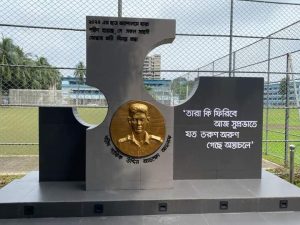It has been a year since 17-year-old Shafiq Uddin Ahmed Ahnaf gave his life for a dream—a Bangladesh free from injustice and discrimination. For his family, the pain of losing him has not faded. But neither has the pride.
Ahnaf, a Class 11 student at BAF Shaheen College in Dhaka, was fatally shot on August 4, 2024, during a student protest in the capital’s Mirpur-10 area. The demonstration was part of the growing anti-discrimination movement that, just one day later, brought down Sheikh Hasina’s long-standing authoritarian regime.
His mother, Jartaj Parveen, remembers his final words with a voice heavy with grief—and pride.
“He used to tell me, ‘One day I’ll do something that will make you proud of me.’ And he did,” she said.
Ahnaf’s name is now woven into the fabric of Bangladesh’s student movement, remembered alongside martyred youth like Shaheed Abu Sayeed and Mugdho. For those who took to the streets last year, his sacrifice has become a symbol of hope—and the steep price of change.
Jartaj Parveen recalls trying to stop her son from joining the protests.
“He told me, ‘If mothers were like you in 1971, Bangladesh would never have become independent,’” she said, her voice trembling. “How could I argue with that?”
Ahnaf had already sustained rubber bullet injuries in an earlier protest. His parents begged him to stay home, just for one more day. They had planned to join the long march together.

But on August 4, he slipped out in the afternoon, determined not to wait. Around 5 p.m., near the Fire Service office in Mirpur, he was shot. He died of his injuries later that day—just hours before the regime fell.
The Ahmed family, originally from Manikganj, had moved to Dhaka seeking a better future. Ahnaf’s father, Nasir Uddin Ahmed, works as a salesman; his mother is a homemaker. His younger brother, Iftikhar, now 14, still struggles to come to terms with the loss.
“He never ate with his own hand,” Jartaj whispered. “I fed him every day. Now, whenever I sit down to eat—or someone knocks at the door—I feel like he’s coming home.”
Their modest home is filled with his presence: his reading table, his guitar, his bright yellow football shoes. His beloved black cat, Niggy, still roams the house, as if searching for him.
“He loved music and football. He wanted to form a band someday,” his father said. “He never wanted a job—he wanted to be a businessman, a leader.”
Pulling out a small box from under the bed, Nasir carefully unfolded the clothes his son last wore.
“A fellow protester wrapped his body in the national flag and rushed him to the hospital,” he said. “Now I want a country worthy of the blood of children like Ahnaf.”
Ahnaf was laid to rest on August 5 at the Martyred Intellectuals’ Graveyard—his name now part of Bangladesh’s history.
Two months later, on October 3, his mother filed a formal complaint with the Chief Prosecutor of the International Crimes Tribunal, demanding justice for her son.
“Before I die,” Nasir said, “I want to see justice served for my boy.”


